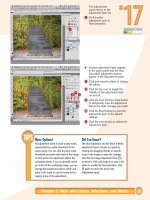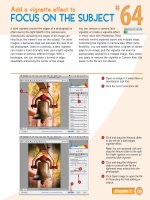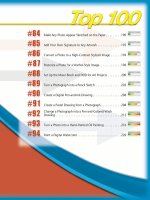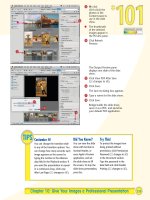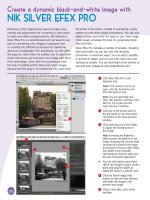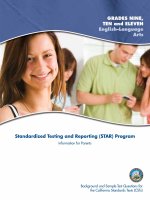Sourcing information for your project
Bạn đang xem bản rút gọn của tài liệu. Xem và tải ngay bản đầy đủ của tài liệu tại đây (31.44 KB, 2 trang )
1.
2.
3.
4.
SOURCING INFORMATION FOR YOUR PROJECT
1.1. page 37
The conclusion
->you restate the thesis from your introduction (but do not repeat the introduction too
closely), make a brief summary of your evidence and finish with some sort of judgment about
the topic. You can follow this basic pattern (recipe) for writing introduction paragraphs to
help you get started.
A quotation
-> a phrase or short piece of writing taken from a longer work of literature, poetry, etc. or
what someone else has said
A reference in the text
-> In-text references or citations are used to acknowledge the work or ideas of others.
They are placed next to the text that you have paraphrased or quoted, enabling the reader to
differentiate between your writing and other people's work. The full details of your in-text
references must be included in a reference list
A subtitle/subheading
-> As nouns the difference between subtitle and subheading is that subtitle is a heading
below or after a title while subheading is any of the headings under which each of the main
divisions of a subject may be subdivided
5. The introduction
->The introduction serves the purpose of leading the reader from a general subject area to
a particular field of research. It establishes the context of the research being conducted by
summarizing current understanding and background information about the topic, stating the
purpose of the work in the form of the hypothesis, question, or research problem, briefly
explaining your rationale, methodological approach, highlighting the potential outcomes your
study can reveal, and describing the remaining structure of the paper.
6. Thesis statement
-> A thesis statement is a sentence that states the topic and purpose of your paper. A good
thesis statement will direct the structure of your essay and will allow your reader to
understand the ideas you will discuss within your paper.
7. The biliography
-> is a list of all of the sources you have used (whether referenced or not) in the process
of researching your work. In general, a bibliography should include: the authors' names; the
titles of the works; the names and locations of the companies that published your copies of
the sources; the dates your copies were published; the page numbers of your sources (if they
are part of multi-source volumes)
8. The first name initials of an author/ research
Ex: Nguyen Minh Triet->Triet. M. N
-> the first-name initial=given name (Nguyen)
9. The family name of an author/research
-> family name=last name=surename (Triet)
->initials(~middle name/the first letter of your middle name)
10. A figure or table
- Tables are numerical values or text displayed in rows and columns.
-A Figure is any type of illustration (chart, graph,photograph, drawing maps ...) other
than a table.
11. The abstract
-> summarizes the main contents of your thesis and should give the reader a well-defined
idea of what the thesis is about. Readers often use the abstract to determine whether or not the
text is relevant for them to read.
12. Table of contents
-> Longer works usually have a table of contents. You will most likely be expected to use
a certain format according to the template you are using. Otherwise most word processors
will have formatting tools you can use to create a table of contents. Make sure to structure
your table of contents in a way that makes the relationship between sections and subsections
apparent to the reader.



